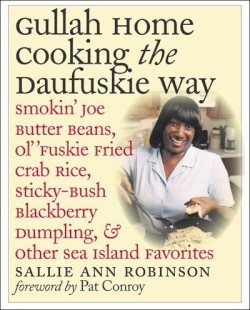Gullah Home Cooking the Daufuskie Way
Sea Island Favorites
“It’s not as if the world never knew Daufuskie … But when I was coming up, the world was dancing, for the most part, without us.” The author, a native of Daufuskie, one of South Carolina’s sea islands and home of the Gullah people, writes of her early years, delivering intimate glimpses into Gullah life along with 100 recipes, organized by the source of the ingredients-river, garden, or woods-including typical Daufuskie favorites, like breads, sweets, quick meals, and rice.
Food was central to Daufuskie life, from casting for the speckled sea trout in island creeks to crisping them in bacon grease in iron skillets. Accustomed to daily hard work to procure food, these descendants of West African slave culture felt secure, and they were largely unaware that their culture was independent and self-sustaining. “My sisters and I never knew we were Gullah,” writes the author. “I remember the first time some tourists asked me if I could speak Gullah. I asked back, ‘What be dat?’”
Robinson’s recipes are no-nonsense and clear, though written in dialect. Most need only a handful of ingredients: eggs, fish, bacon, onions, green pepper, greens, cornmeal, flour, a spice. Her straightforward, candid voice makes tempting reading; she understands both humanity and food: “If you were walking down a road or path and smelled the ’roma of fresh cornbread, lima beans, and fried chicken, you could follow your nose to a good meal. And you were always welcome. Sharing from one hand to another made good meals available to all.”
The photographs capture food and locale: tin-roofed dwellings, wooden boats, iron stoves, dark hands shelling peas, shucking oysters, or holding blue crabs. Because recipes like Conch Soup that contain smoked pork neck bones, bacon, lard, and cooking oil are unhealthy by modern standards, Robinson devotes two pages to explanation, if not defense, of her recipes, citing their authenticity and offering healthier substitutions such as vegetable oil for bacon grease or “peanut, canola, sunflower, or olive oil” for lard or tallow. The worth of the book, however, is its very authenticity, and readers might be tempted to add some pork neck bones to a pot of turnip greens to taste true Gullah food. Other readers will read text and recipes with wonder at Daufuskie food, the way it once was.
Disclosure: This article is not an endorsement, but a review. The publisher of this book provided free copies of the book to have their book reviewed by a professional reviewer. No fee was paid by the publisher for this review. Foreword Reviews only recommends books that we love. Foreword Magazine, Inc. is disclosing this in accordance with the Federal Trade Commission’s 16 CFR, Part 255.

